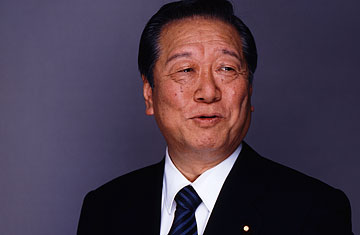
Ichiro Ozawa
(2 of 3)
TIME: You have long argued that Japan needed to be a "normal" country, a country in which politicians took responsibility. Do you think this is as relevant today?
OZAWA: Totally relevant. Without this reform we will not be able to create a new Japan. However, I would like add the following point so that I am not misunderstood. I'm not saying that bureaucracy is unnecessary. What I'm saying is that the basic policy course should be set by politicians. And once the course is set the specific policies are supposed to be implemented by the bureaucrats. That means that the bureaucrats, like the politicians, are supposed to do their own jobs.
TIME: Some economists have said that Japan is yet to recover from the lost decade. What specifically are you going to do about reinvigorating domestic demand?
OZAWA: When you take a look at the overall economy as far as Japan is concerned, personal spending accounts for more than 60% of GDP; in the case of the United States it is more than 70%. So that means to sustain personal consumption we have to give assurance to the people that they will be able to have a stable income and that their future is assured. Therefore, real income has to be raised, and we have to give a sense of security to the population through reforms to the pension system. I'm very concerned about the younger generation. They are worried they will not be entitled to any pension benefits in the future.
TIME: What you're saying is that if people have a sense of security they won't just put their money under the bed, they'll go out and spend it and domestic demand will grow. If people feel safe, that they're going to be able to pay their medical bills, that they're going to have a pension, then they will be encouraged to increase domestic demand?
OZAWA: That is true. And at the same time, as I mentioned earlier, we have to make some change to income distribution to benefit the average person.
TIME: The alliance between the U.S. and Japan is one of the cornerstones of international security. How does Japan see the relationship?
OZAWA: I consider that the Japan-U.S. alliance is the most important relationship for Japan — not only in the political field, but also in the economic field as well as in culture and the arts. The two countries have to develop a friendly relationship built on mutual trust.
TIME: And national security?
OZAWA: It is quite natural to say that the two countries have to pursue a very close relationship in the area of national security. If Japan is exposed to any kind of military attack, we can exercise our right to self-defense, and also, according to the terms of the Japan-U.S. Security Treaty, we can request assistance from the United States. In other words, it is only in such a case that we can exercise our right to defense, whether individually or collectively.
That's about a military attack on our own sovereignty. But when it comes to global disputes, these should be settled through international cooperation. In other words we have to take a U.N.-centered approach to solve such problems. I think President Obama and his administration also supports this kind of approach. The Bush administration started wars in Afghanistan and in Iraq without any consensus in the international community. At this point in time the United States has reconfirmed and recognized the fact that such disputes will not be settled by a single country. In other words, when it comes to an exercise of power by the United States alone, then Japan is not able to go along. But if the international dispute settlement is arranged within the U.N. framework, with the cooperation of the international community, then my view is that Japan should be proactive in rendering support as much as possible. That position is starkly different from the position taken by the LDP.
TIME: The Obama administration stresses cooperation in Afghanistan. What would a DPJ-led government do about increasing Japan's role there?
OZAWA: As far as Afghanistan is concerned, there is a U.N.-led military organization there called ISAF. Japan will be able to render as much support as possible to that kind of organization under a DPJ government. However, what ISAF is trying to do is to bring peace by suppression, by force. My philosophy is that no people can be ruled by sheer force. In the past Afghanistan was a self-sustaining country in terms of food supply, but now the self-sufficiency rate has plunged to a level of 40%. They are living in a kind of sheer poverty, and what is most needed is to give a stable life to the majority of people living in Afghanistan. That means that guns should be replaced with ploughshares. By doing so, those people will be able to rebuild their lives. And in this situation, al-Qaeda and the Taliban will naturally not be able to thrive.
